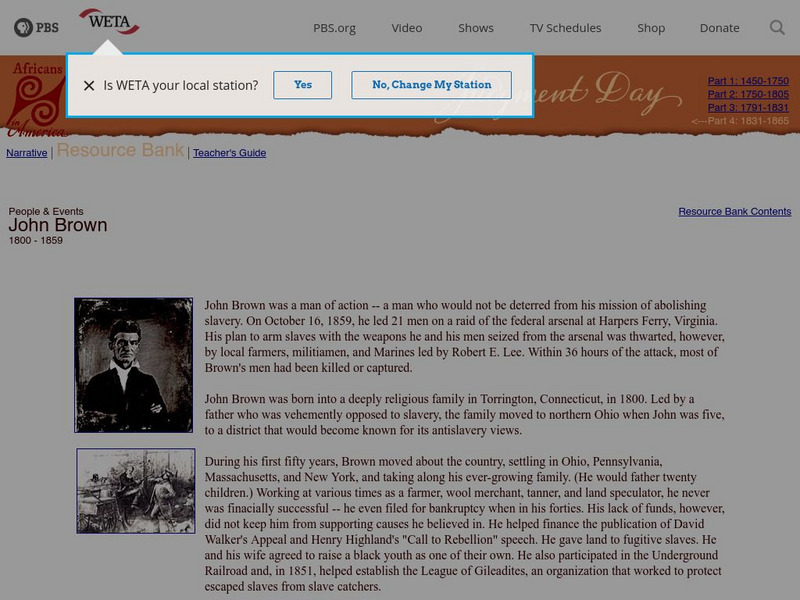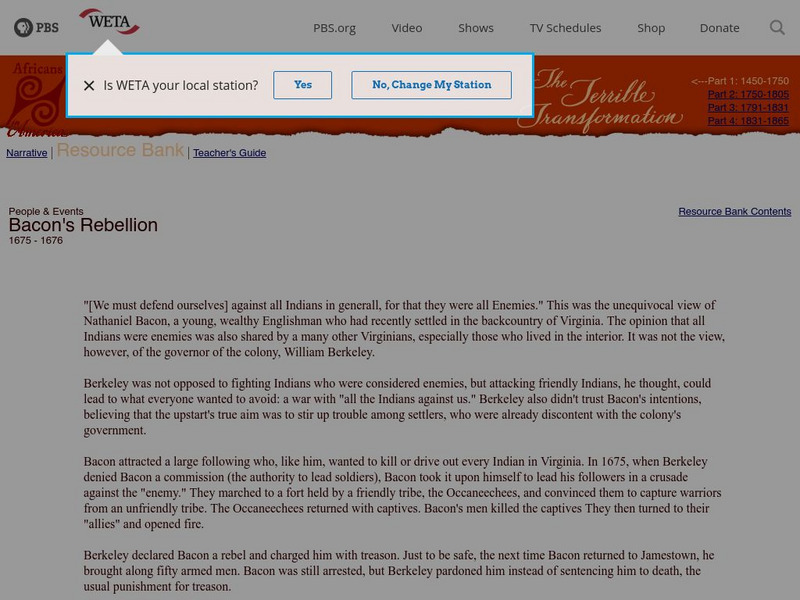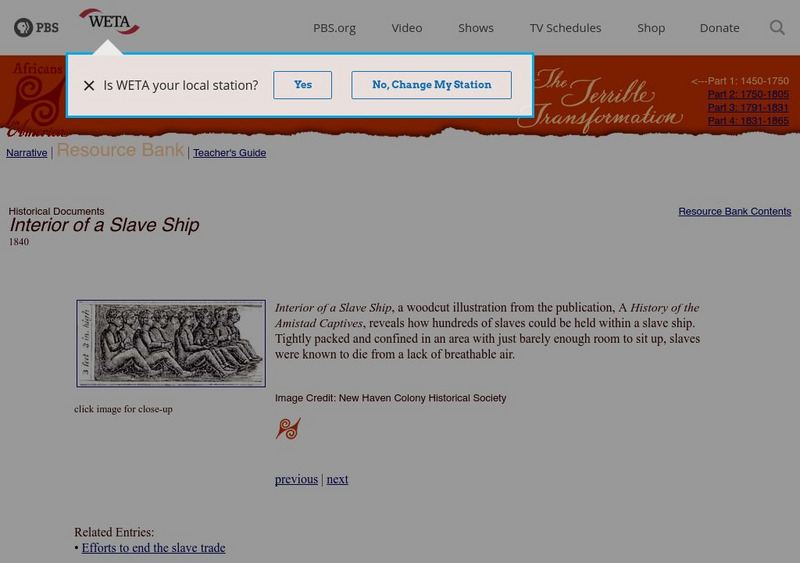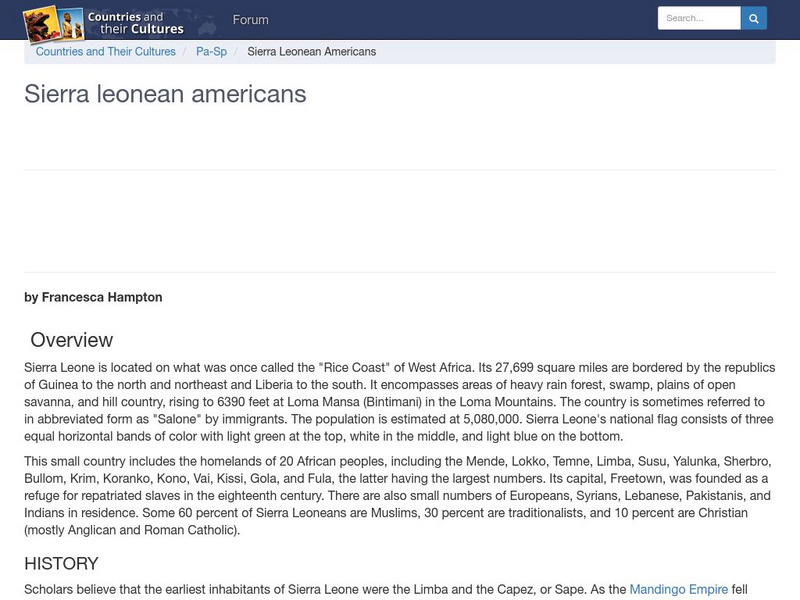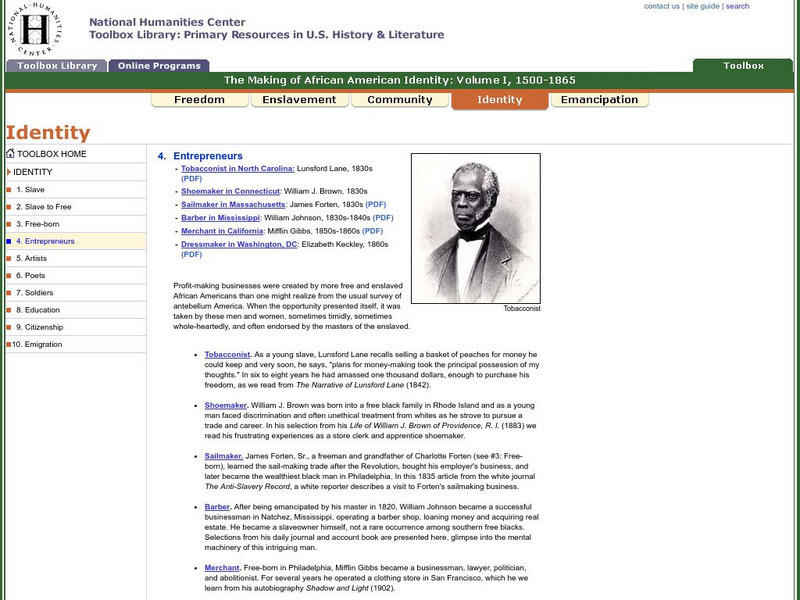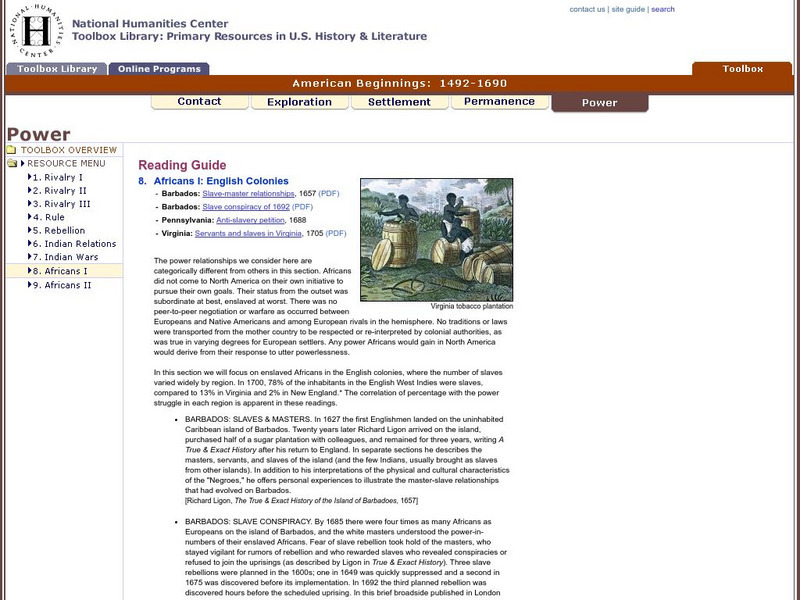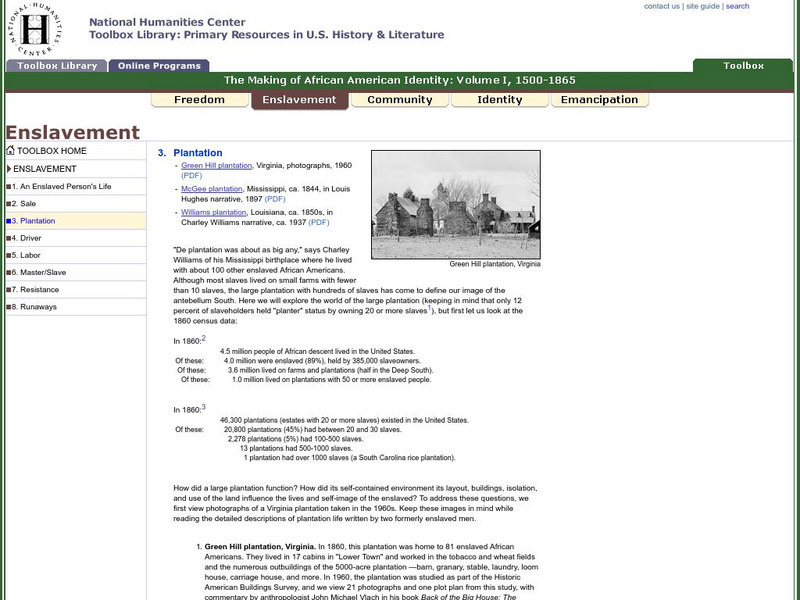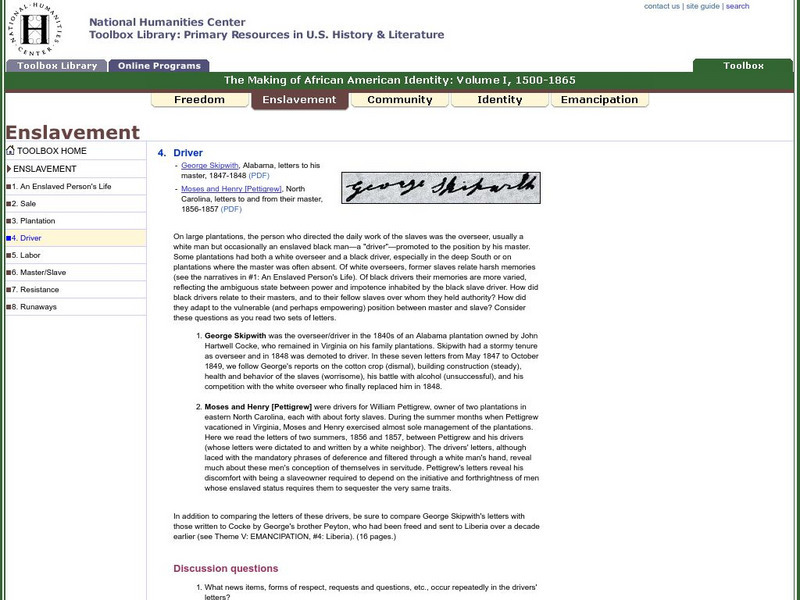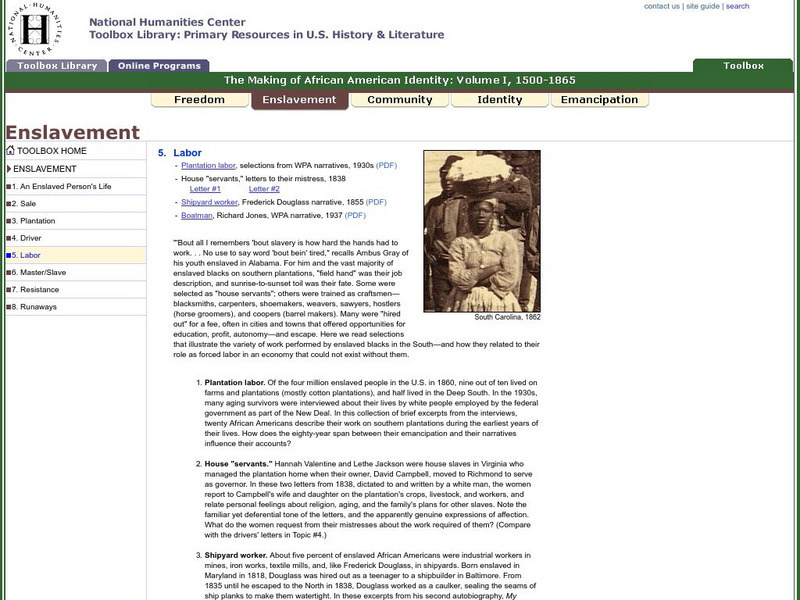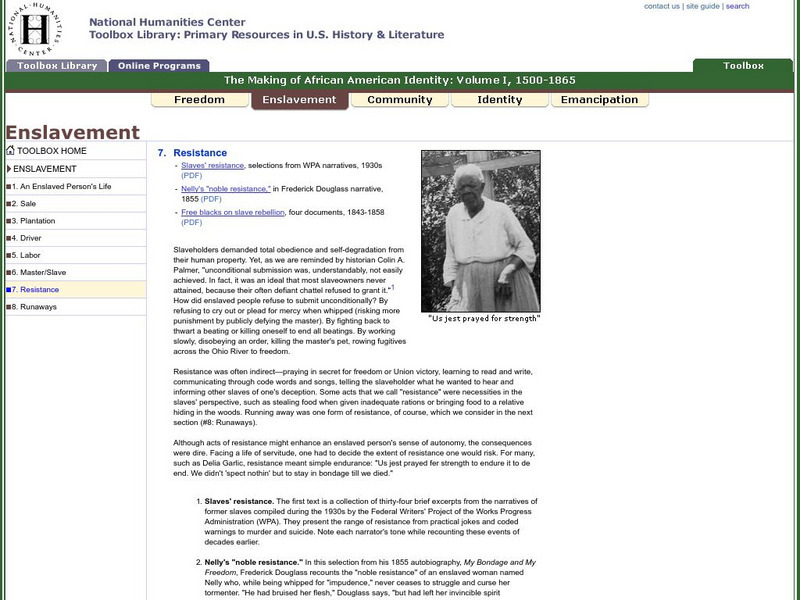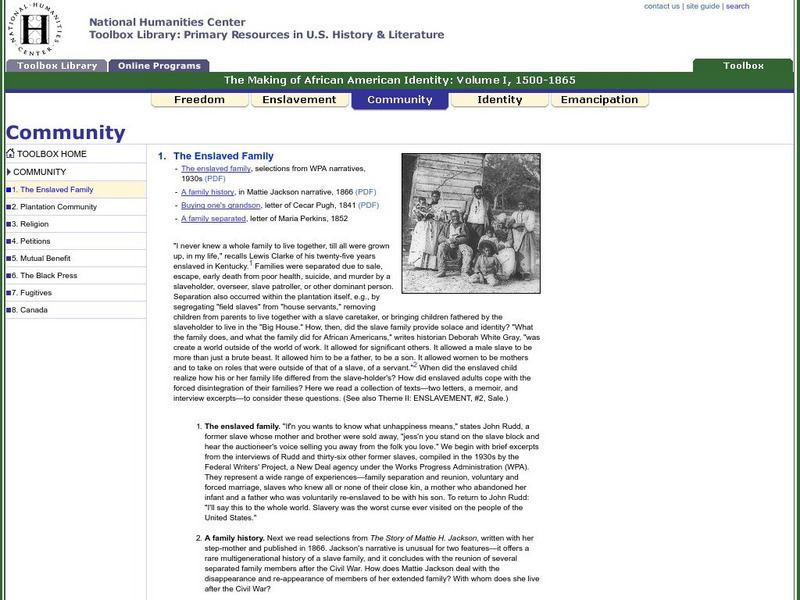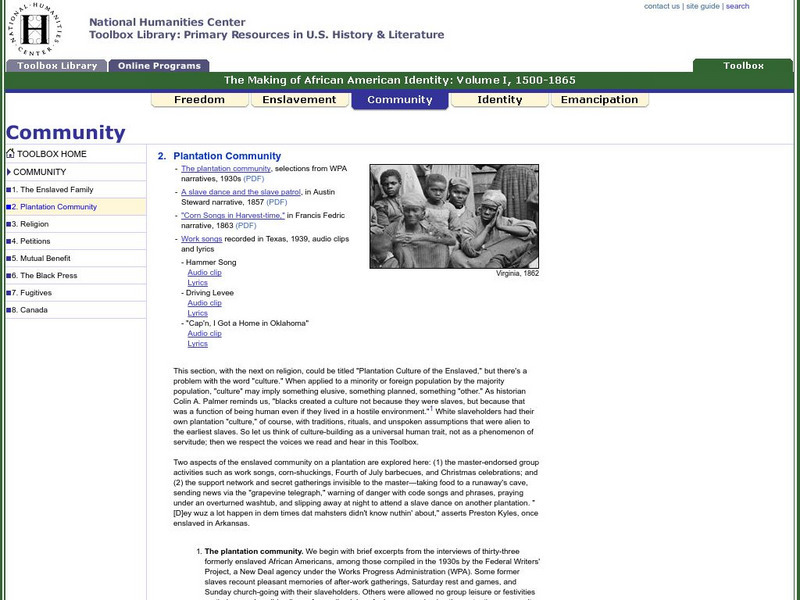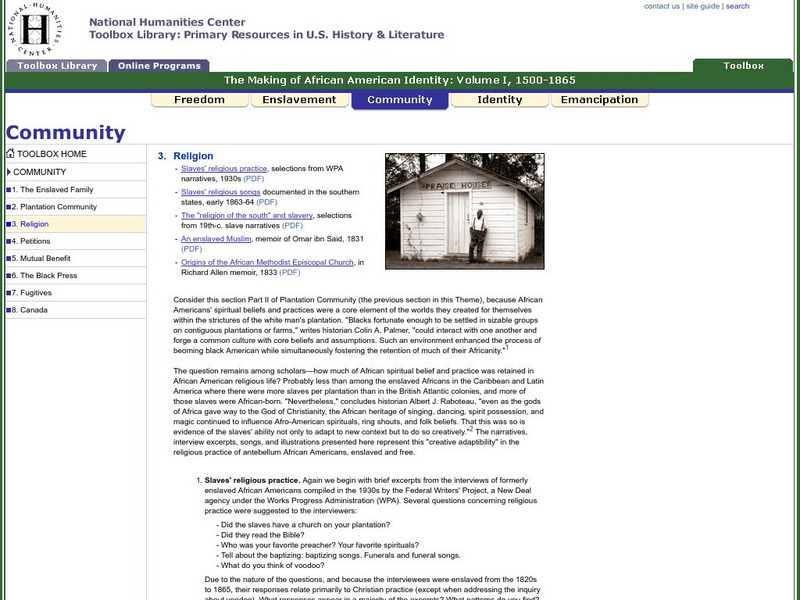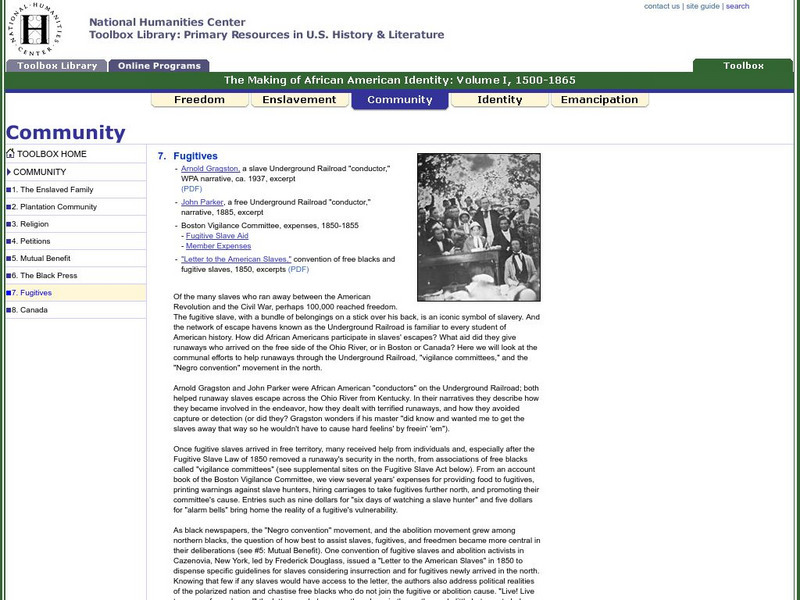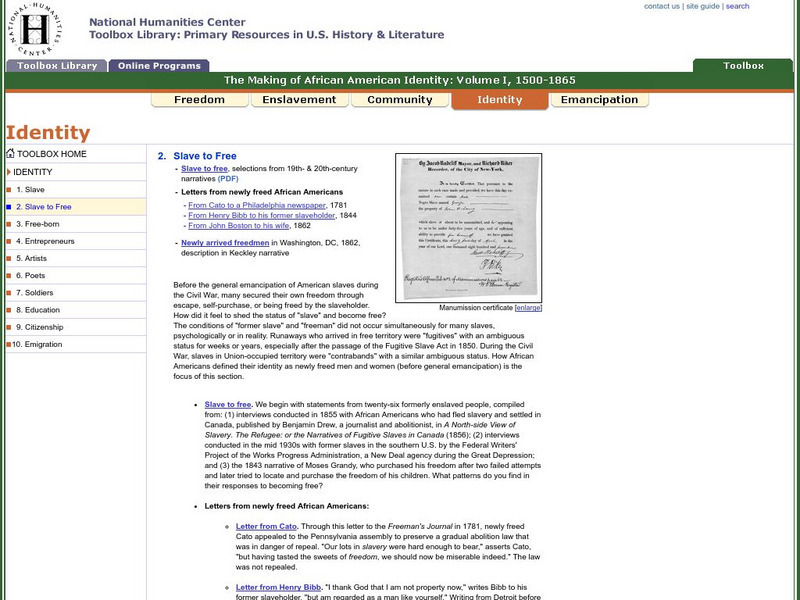PBS
Africans in America: William Byrd's Diary
Excerpts from "The Secret Diary of William Byrd" in which, among other things, he describes slaves as piece of property.
PBS
Africans in America: John Brown's Black Raiders
This page provides information on the black men who took part in John Brown's Raid. Includes quotes of associates referring to the men.
PBS
Africans in America: John Brown
PBS Online provides a brief biography of John Brown and the way his life affected the abolitionist movement and contributed to the start of the U.S. Civil War.
PBS
Africans in America: Bacon's Rebellion
This site provides an overall view of the causes and effects of Bacon's Rebellion, the 1676 Virginia uprising which left Jamestown in flames.
PBS
Africans in America: American Colonization Society
Learn about the views of the American Colonization Society (ACS) and about their efforts to send free blacks to Liberia. This website briefly overviews how the ACS started and how their efforts lead to the emigration of thousands.
PBS
Africans in America: Interior of a Slave Ship
This site describes how slaves were packed in the ships with barely enough room to sit or move, to maximize capacity.
PBS
Africans in America: Harriet Jacobs
Read about Harriet Jacobs'(1813-1897 CE) childhood as a slave and her escape from slavery -- the experiences from which she created her slave narrative, "Indidents in the Life of a Slave Girl," which "Was one the first open discussions...
Countries and Their Cultures
Countries and Their Cultures: Multicultural America: Sierra Leonean Americans
Provides an overview of the traditional culture and lifestyle of Sierra Leonean Americans. (Note: Content is not the most current.)
Library of Congress
Loc: America's Story: Dizzy Gillespie
Dizzie Gillespie helped create a new form of modern jazz called be-bop. It was the predecessor of hip-hop that is so popular today.
PBS
Pbs: Africans in America: Part 3: Eli Whitney's Cotton Gin
History of Eli Whitney and his cotton gin. Other links to sites with information on this topic.
National Humanities Center
National Humanities Center: Toolbox Library: Community, Making of African American Identity: V. 1, 1500 1865
Twenty nine primary sources-historical documents, literary texts, and visual images-that explore how enslaved individuals and families coped with, adjusted to, maintained communities within, and opposed the system of oppression.
National Humanities Center
National Humanities Center: Toolbox Library: Entrepreneurs, Making of African American Identity: V. 1
Six mid-nineteenth century accounts by free-born black entrepreneurs about their economic activities and struggles. Links to documents describing each trade are provided within this well-developed resource.
National Humanities Center
National Humanities Center: Toolbox Library: Civil War I: Slaves, Making of African American Identity: V. 1
Photographs of slaves during the Civil War and war memories of former slaves during that conflict. Links to two separate resources can be found here, each focusing on the war memories of former slaves.
National Humanities Center
National Humanities Center: Toolbox Library: Africans I, American Beginnings: 1492 1690
Four accounts of the complex power relationships between slaves and slave holders within English colonies in Barbados, Virginia and Pennsylvania, as well as documents about slave revolts and anti-slavery agitation.
National Humanities Center
National Humanities Center: Toolbox Library: Sale, Making of African American Identity: V. 1
Two nineteenth century depictions of the emotional brutality of slave auctions-by an enslaved (formerly free) black man and by former slaves-and several recollections of being sold by former slaves recorded during Depression era...
National Humanities Center
National Humanities Center: Toolbox Library: Plantation, Making of African American Identity: V. 1
Numerous photographs of a Virginia plantation (taken in 1960), an autobiographical account of life on a Mississippi plantation from the nineteenth century, and an interview with a former slave about a Louisiana plantation recorded in 1937.
National Humanities Center
National Humanities Center: Toolbox Library: Driver, Making of African American Identity: V. 1
Unusual letters from black slave drivers, and in one case, letters in reply from the white slave owner, about crops, labor, and conditions on plantations in the mid-1850s.
National Humanities Center
National Humanities Center: Toolbox Library: Labor, Making of African American Identity: V. 1
Selections of original accounts either written during slavery or recorded in the 1930s that depict work as a plantation laborer, house servant, shipyard worker or boatman.
National Humanities Center
National Humanities Center: Toolbox Library: Resistance, Making of African American Identity: V. 1
Recollections of slave resistance by observers like Frederick Douglass, narratives of slave resistance collected during the Depression, and mid-nineteenth century accounts by former slaves calling for resistance to and overthrow of the...
National Humanities Center
National Humanities Center: Toolbox Library: The Enslaved Family, Making of African American Identity: Vol. 1
This site offers two letters and a memoir from the mid-nineteenth century, and interviews from the early-twentieth century, about the importance and the roles of enslaved families.
National Humanities Center
National Humanities Center: Toolbox Library: Plantation Community, Making of African American Identity: V. 1
Various retrospective oral accounts from the early-twentieth century and two narratives from the mid-nineteenth century that examine the work, interrelationships, dangers, and lives of slaves on southern plantations.
National Humanities Center
National Humanities Center: Toolbox Library: Religion, Making of African American Identity: V. 1
A series of songs, narratives, and memoirs that examine the spiritual beliefs of and experiences with religion among slaves in southern plantation communities.
National Humanities Center
National Humanities Center: Toolbox Library: Fugitives, Making of African American Identity: V. 1
Oral and written narratives of the experiences of the Underground Railroad and documents identifying efforts by northern societies to free slaves during the 1850s.
National Humanities Center
National Humanities Center: Toolbox Library: Slave to Free, Making of African American Identity: V. 1
Interviews with and narratives from former slaves who became free and letters from former slaves reflecting on their freedom.




